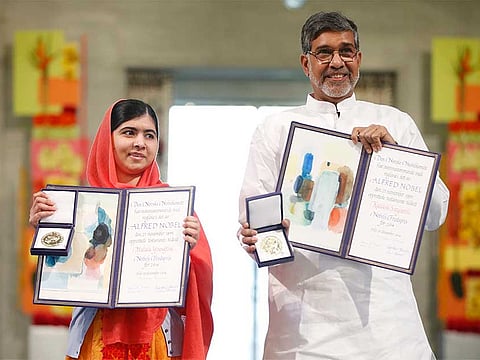Malala Yousafzai, Kailash Satyarthi receive Nobel Peace Prize
Pairing had extra symbolism of linking countries that have been in conflict for decades

Oslo: Pakistani schoolgirl Malala Yousafzai received the Nobel Peace Prize on Wednesday as the youngest ever laureate, sharing her award with Indian child rights campaigner Kailash Satyarthi.
“A young girl and a somewhat older man, one from Pakistan and one from India, one Muslim, the other Hindu; both symbols of what the world needs: more unity. Fraternity between the nations!” Thorbjoern Jagland, chairman of the Norwegian Nobel committee, said at the ceremony in Oslo.
Minutes after Malala, 17, received the prize, a man carrying a Mexican flag walked towards her, but was caught by security. His motives were unknown.
In a speech peppered with self-deprecating humour, the youngest ever Nobel recipient used the award ceremony to call not just for education but also fairness and peace.
“The so-called world of adults may understand it, but we children don’t. Why is it that countries which we call ‘strong’ are so powerful in creating wars but so weak in bringing peace?” she said in her speech.
Malala, who described herself as the “first recipient of the Nobel Peace Prize who still fights with her younger brothers,” triggered applause but also frequent outbursts of laughter during her speech.
The newly minted laureate has herself often expressed her wish to lead — setting sights on one day becoming Pakistani prime minister and following in the steps of the late Benazir Bhutto.
And it was in talking about home, about Pakistan, that this child of steel melted — a bit. It was as if all the excitement about the Nobels, all the interviews, all the banquets just faded for a moment as she described her pride in being Pakistani and what the award would mean for people back home.
“There was a time this region of the world was called a terrorist place, and many people get scared of it. No one even tried to say the name of this country,” she said. “So I am really proud to tell people that the people of Pakistan are peaceful, they have harmony, they love each other, they believe in brotherhood.
“But there are some extremist-minded people who misuse the name of Islam and who give a bad name of our country,” she said. “But that’s not true. Many people are standing up for children’s rights, women’s rights and for human rights.”
Yousafzai is sharing the prize with Kailash Satyarthi of India.
Satyarthi, 60, was recognised by the Nobel committee for a 35-year battle to free thousands of children from virtual slave labour.
“I refuse to accept that the world is so poor, when just one week of global military expenditure is enough to bring all of our children into classrooms,” he said after receiving the prize.
“I refuse to accept that the shackles of slavery can ever be ... stronger than the quest for freedom.”
Indian Prime Minister Narendra Modi on Wednesday congratulated Satyarthi and Malala.
“The entire nation watches the ceremony in Oslo with great joy and immense pride. Congratulations @k_satyarthi!
“I also congratulate the young Malala Yousafzai for the momentous achievement,” Modi tweeted soon after the awards were conferred.
Pakistan’s Prime Minister Nawaz Sharif gave his congratulations too.
“The dream of Malala regarding girls’ education shall be realised,” Pakistan Radio quoted Sharif as saying.
The pairing of Malala and Satyarthi had the extra symbolism of linking neighbouring countries that have been in conflict for decades.
After she was named as the winner, Malala said she wanted both states’ prime ministers to attend the prize-giving ceremony in Oslo.
“If the prime ministers had come here I would have been very happy,” she said. “I would have thought of it as a big opportunity to ask them ... to make education their top priority and work on it together because we see the number of children who are out of school and suffering from child labour are mostly in India and Pakistan.”
Sarod maestro Amjad Ali Khan and his sons Amaan and Ayaan performed at the Nobel Peace Prize Concert, spreading the message of peace, harmony and non-violence with a special ‘Raga For Peace’ conceived for the occasion.
The ceremony began with an Opera performance by Norwegian classical pianist Edward Grieg and singer Hans Christian Andersen.
It was followed by Pakistani singer Rahat Fateh Ali Khan’s performance on his uncle Nusrat Fateh Ali’s famous Sufi composition ‘Allahu Allahu’ with his troupe.
Nobel winners receive eight million Swedish kronor ($1.1 million, 862,000 euros), which is shared in the case of joint wins.
The Peace Prize is the only Nobel award handed to recipients in Oslo.
The other prizes — also featuring the literature prize winner, Frenchman Patrick Modiano, and his compatriot Jean Tirole with the economics award — will be awarded in Stockholm later Wednesday.
Sign up for the Daily Briefing
Get the latest news and updates straight to your inbox



